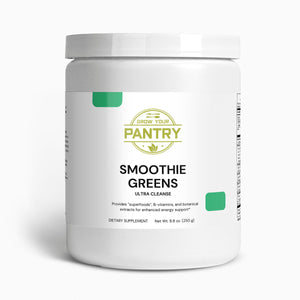Probiotics And Sauerkraut: The Complete Guide

Sauerkraut undergoes anaerobic fermentation during which naturally occurring bacteria and yeast cultures found on the raw cabbages multiply and enrich the ferment with billions of live probiotics. Upon consumption, these probiotics get down to work, improving your gut health and overall immunity. This guide seeks to shine the light on all potential health benefits of consuming sauerkraut probiotics.
Not Much Time? Skip To What You'd Like To Learn...
-
WHAT ARE PROBIOTICS?
-
WHAT IS SAUERKRAUT?
-
HEALTH BENEFITS OF PROBIOTICS
-
DO ALL SAUERKRAUT VARIETIES CONTAIN PROBIOTICS?
-
DOES SAUERKRAUT CONTAIN ALL THE PROBIOTICS I NEED?
-
HOW TO INCREASE THE AMOUNT OF PROBIOTICS IN SAUERKRAUT?
-
COMMON KIMCHI & SAUERKRAUT DISHES AND RECIPES
-
DOES COOKING SAUERKRAUT KILL THE PROBIOTICS?
-
HOW MUCH SAUERKRAUT TO EAT PER DAY FOR GUT HEALTH
-
BEST WAY TO EAT SAUERKRAUT FOR HEALTH BENEFITS
-
OTHER TYPES OF FERMENTED FOODS AND HOW THE PROBIOTICS COMPARE
-
ARE SAUERKRAUT PROBIOTICS HARMFUL?
-
Common Questions
What Are Probiotics?
Probiotics are live yeast and bacteria that have a positive effect on the gut bio and overall digestive system. Probiotics accomplish this by replacing the ‘good’ bacteria that might have been lost after consuming antibiotics and also balancing the ratio of ‘good’ and ‘bad’ bacteria. As a result, your digestive system is able to break down food as required while also reducing the occurrence of diarrhea, irritable bowel, and gassiness. Ref: healthline.com.
What Is Sauerkraut?
Sauerkraut is a fermented dish that’s prepared by anaerobically fermenting sliced raw cabbages in brine. The brine serves to flavor the food while also establishing inhabitable conditions for harmful bacteria, which might seek to contaminate the ferment. As the naturally occurring cultures feed on the carbs in the cabbage leaves, they produce lactic acid, which keeps off harmful bacteria and gives the sauerkraut a mildly acidic taste. After 20 days of fermentation, the end result is a superfood enriched with minerals, vitamins, and billions of live probiotics.
Health Benefits Of Probiotics
Improving Digestive Health - Scientists have discovered strong evidence that suggests that probiotics can have a long-term positive impact on digestive health. This is due to their ability to replace lost ‘good’ bacteria in the gut bio while also exterminating harmful bacteria from the digestive tract. Probiotics have a significant impact on irritable bowel syndrome and will gradually reduce some of the symptoms, such as excessive gas, bloating, constipation, and diarrhea. Probiotics can also help in curing antibiotic-associated diarrhea, which occurs after prolonged use of antibiotics. Ref: nih.gov.
Assisting In Weight Loss - Probiotics influence a couple of factors that are involved in the process of weight loss. For starters, some probiotics inhibit the absorption rate of dietary fats, thus reducing the overall fat gain in the body. Other probiotics release appetite-reducing hormones, which reduce the consumption of food, allowing the body to burn the calories and fats it has already stored. Ref: healthline.com.
Reducing Inflammation - Probiotics produce an anti-inflammatory effect that plays a critical role in reducing chronic inflammation. The anti-inflammatory effect is generally more noticeable in people with chronic arthritis, whereby consumption of probiotic-rich food such as sauerkraut regularly can offer relief from the chronic pain. If you would like to try probiotic supplements for their anti-inflammatory effect, you should seek your doctor’s advice on the dosage and possibility of adverse reactions with ongoing medication. Ref: ncbi.gov.
Lowering ‘Bad’ LDL Cholesterol - Probiotics rich foods offer an exciting alternative to the use of drugs to reduce bad LDL cholesterol. These drugs typically have more pronounced side effects; therefore, having a natural and generally safe alternative makes the job much easier. Probiotics also balance out the amount of good cholesterol in the body to keep your cardiovascular system free of any risk factors. Ref: nih.gov.
Managing Blood Pressure - Scientists have demonstrated the positive impact of consuming probiotic-rich food on the overall blood pressure. The studies indicate that regular consumption of probiotics leads to a general reduction in cholesterol, blood glucose, and insulin resistance. The long-term effect of all this is manageable blood pressure while also avoiding the complications that come with high BP, such as ischemic heart disease, stroke, kidney disease, and heart failure. Ref: nlm.gov.
Boosting The Immune Functions - Probiotics have antimicrobial and antagonistic properties that they produce naturally to fight off harmful bacteria. Upon consumption, this effect gets introduced to the gut bio, where it serves as an immune boost and as the body’s first line of defense against harmful bacteria and toxins. Probiotics have also been shown to boost the production of natural antibodies in the immune system. Ref: nih.gov.
Do All Sauerkraut Varieties Contain Probiotics?
|
Sauerkraut Variety |
Does It Contain Probiotics |
|
Homemade Sauerkraut |
Yes |
|
Canned Sauerkraut |
No - pasteurization kills all probiotics |
|
Frozen Sauerkraut |
Yes - the probiotics remain dormant in the frozen state, but upon thawing, they become active once more |
|
Cooked Sauerkraut |
No - exposing sauerkraut to heat during the cooking process denatures most of the probiotics |
|
Yes |
|
|
Yes |
|
|
Yes |
|
|
Yes |
Does Sauerkraut Contain All The Probiotics I need?
No, sauerkraut contains only one major group of probiotics known as lactic acid bacteria (LAB), which is just one type out of hundreds. It is important to note that research on the different varieties of probiotics is still ongoing, but LAB probiotics have a more significant effect on the immune system compared to other varieties.
How To Increase The Amount Of Probiotics In Sauerkraut?
1. Allow The Sauerkraut To Ferment For Longer
Allowing the sauerkraut to ferment for an extended period gives the culture more time to break down the carbs and multiply, giving the final product a taste boost as well as a probiotic boost.
2. Use Fresh Raw Cabbages
Freshly harvested raw cabbages contain more nutrients such as carbs, which the culture feeds on to produce more probiotics during fermentation. Avoid cooked cabbages as they lack the naturally occurring bacteria and yeast cultures required for the fermentation to take place.
3. Add Sugar
Adding a few teaspoons of sugar to the sauerkraut during fermentation increases the number of carbs available for the probiotics to feed on. It is important to note that the sugar will not increase the calorie count of the sauerkraut as the bacteria culture will break down all of the sugar into lactic acid, further enhancing the flavor of the sauerkraut while also increasing probiotic content.
Does Cooking Sauerkraut Kill The Probiotics?
Yes, exposing sauerkraut to heat will kill the probiotics, thus taking away the expected probiotic benefits. This can be avoided by adding sauerkraut to your dish in the final steps after cooking so as to reduce the number of probiotics lost to heat.
How Much Sauerkraut To Eat Per Day For Gut Health
The NIH recommends a regular intake of around 7 to 10 g of sauerkraut per day for the best gut health results. You can, however, eat more or less depending on your diet plan and the advice of your doctor.
Best Way To Eat Sauerkraut For Health Benefits
The best way to eat sauerkraut for health benefits is while raw and uncooked. This ensures that your gut bio retains as many probiotics as it needs without any adverse side effects. Raw sauerkraut also contains a higher amount of nutrients compared to cooked sauerkraut dishes as heat denatures most vitamins.
Other Types Of Fermented Foods And How The Probiotics Compare
Sauerkraut Vs. Yogurt - Yogurt and sauerkraut contain the same group of probiotics known as lactic acid bacteria (LAB).
Sauerkraut Vs. Kimchi - Unlike sauerkraut, kimchi contains four strains of probiotics, which can be classified into LAB varieties and leuconostoc mesenteroides strains. This gives kimchi a probiotic upper hand compared to sauerkraut.
Sauerkraut Vs. Kefir - Kefir relies on LAB culture to ferment just like sauerkraut, so they have around the same number of probiotic strains.
Are Sauerkraut Probiotics Harmful?
Sauerkraut is classified as a high-risk food just like other fermented products due to the high possibility of contamination during fermentation. As a result, sauerkraut can be a risk to high-risk individuals such as pregnant mothers, AIDS patients, and patients on chemotherapy or any other immunosuppressant drugs.
Common Questions
Does Cooking Sauerkraut Kill The Probiotics?
Yes, exposing sauerkraut to heat will kill the probiotics, thus taking away the expected probiotic benefits. This can be avoided by adding sauerkraut to your dish in the final steps after cooking so as to reduce the number of probiotics lost to heat.
How Much Sauerkraut Should I Take A Day For Probiotics?
The NIH recommends a regular intake of around 7 to 10 g of sauerkraut per day for the best gut health results. You can, however, eat more or less depending on your diet plan and the advice of your doctor.
Are Fermented Foods Better Than Probiotic Supplements?
Yes, fermented foods contain naturally balanced probiotic strains, unlike probiotic supplements that have artificially populated probiotic strains.
What Is The Best Sauerkraut For Probiotics?
Raw, unpasteurized sauerkraut offers the best probiotic benefits.
Should Sauerkraut Be Rinsed?
No, rinsing sauerkraut washes away most of the probiotic content which gets left behind after fermentation.
Why Does Sauerkraut Make You Poop?
Yes, sauerkraut contains billions of probiotics that enhance the digestive tract for regular bowel movements while also supplying dietary fiber, which makes it much easier for stool bulking and movement.
Does All Sauerkraut Have Probiotics?
No, not all varieties of sauerkraut contain probiotics. Cooked, canned and pasteurized sauerkraut varieties do not contain probiotics.
Is Sauerkraut Good For Your Liver?
Yes, sauerkraut contains probiotics that have a detoxifying effect allowing liver cells to recover and replace damaged cells.







My wife makes homemade sauerkraut 👍
uninhabitable for bad bacteria
“The brine serves to flavor the food while also establishing inhabitable conditions for harmful bacteria, which might seek to contaminate the ferment. "
This is surely a mistake, missed by your proof-reading.
I don’t think you want to create “inhabitable conditions for harmful bacteria”, I think you want to do the opposite!
Do you mean inhospitable?